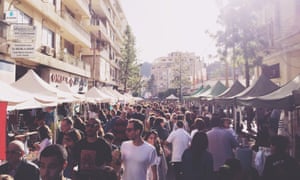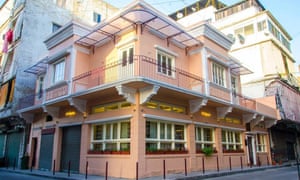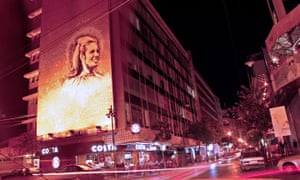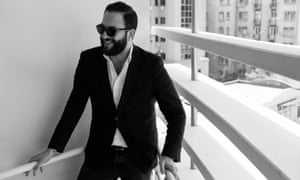 |
| A street market in Mar Mikhael, Beirut … Photograph: Nasri Atallah |
Instagram stories of Syrian refugees, Arabic rap and Armenian food – Nasri Atallah shows us there’s more to the capital of Lebanon than its glamorous clubs, or its troubled politics
In five words
A beautiful, rowdy, intoxicated mess.
Sound of the city
The car horn. Everyone in the city has their hand poised just above it ready to communicate all sorts of emotions. We’ve actually developed an entire non-verbal lexicon. A long beep expresses anger, two short ones are a hello to the local greengrocer, and so on. You can even express political allegiances by playing a tune. I wish they’d have every car horn removed when cars are imported. I think it would make the place friendlier and save everyone a lot of money on whisky and Xanax.
Everyone’s tuning into …
Lebanon’s mainstream TV landscape looks alarming similar to that of most countries around the world at this point, ie some combination of X Factor and Dancing With The Stars. The latest show to capture the imagination is Celebrity Duets, the local variant of a very short lived American franchise – it lasted all of one short season – which pairs celebrities with pop singers for duets. It’s pretty self-explanatory. I think the show is working really well in Lebanon because everyone loves a good singalong, and the celebrity element makes it feel like you’re hanging out with friends.
In this clip, a TV chef who has been on screen for about as long as I can remember performs a culinary-themed duet with pop star Fares Karam.
Best venue
I recently discovered Badguer, an Armenian cultural centre in the area of Bourj Hammoud. They host workshops promoting traditional trades, showrooms for budding artisans, galleries for Armenian artists. Armenians are traditionally recognised as artisans in Lebanon, and many live in Bourj Hammoud. It’s odd, this Central Asian community is very well integrated into national life, but we don’t actually know much about their culture beyond cliches. So this centre is a great place for the transmission of that culture. Oh, and there’s a restaurant with delicious food, which always helps.
Who’s top of the playlist?
I recently saw a great set – Love and Revenge by Rayess Bek and Randa Mirza. I’ve been aware of Bek for a while as a pioneer of Lebanese rap, but here he’s doing something completely different and utterly compelling. It’s a great mashup of electro, traditional Arabic music and images from Egyptian cinema. And they’ve both spent time living in France, so it’s a way of processing their identity as well, I guess.
The independent music scene in Lebanon has gone through a real renaissance over the last few years, with great promoters like Beirut Jam Sessions and festivals like Wickerpark.
What’s the look on the street?
I’m not a reference on style whatsoever, but my wife – Nour Hage – is a fashion designer, so I guess that gives me legitimacy by association to have some sort of opinion. I honestly don’t think there’s an inherently Lebanese street style. Like much else in Beirut it’s a mashup of things people pick up along the way. It can be preppy, normcore or hipster. Depends what street you’re on. However, I’d say the overwhelming aesthetic is glam. People even dress up to go to the grocery store.
Best local artist
My favourite artist – and incidentally one of my favourite people – is Hamed Sinno, lead singer of Mashrou Leila. Even though he’s primarily a musician, and his band have had massive success touring in Europe and North America, I think his artistry goes far beyond the fresh voice he’s bringing to Arabic pop and folk music.
First of all, he’s openly gay. A lot has been already made of that in the international press because it’s a neat headline – and it is undoubtedly brave to live in Lebanon and go on the cover of one of the leading gay magazine in Europe – but he’s about far more than that. He’s very active and vocal about social issues, and incorporates his thinking about the world into meta-narratives that feed back into his music.
There’s something almost academic to his art, an intense desire to understand the root causes of injustice and intolerance, coupled with a drive to do something about it through art.
Best cultural Instagram account
Natalie Naccache is a British-Lebanese photojournalist. She’s represented by Getty, and her work is really impactful. She has documented people in limbo, like Syrian refugees trying to build a life in Lebanon and migrant workers from Africa and south-east Asia.
What does Beirut do better than anywhere else?
Design seems to be the artform we export most successfully, primarily fashion design. The top couture designers – Elie Saab, Rabih Keyrouz – from Lebanon are pretty much household names internationally for anyone who follows red carpet pre-award show banter. I also think it’s not accidental that a lot of visual art, graphic design, filmmaking and advertising comes from Lebanon (or at least from Lebanese people). There’s something about the aesthetic of the place that pushes you to add your touch to it.
Comedy gold
There are a bunch of long-running political satires on television, some old school and some ripping off formats like The Daily Show. But they tend to be on the racist, misogynistic side. Even though they’re pretty popular, I’d rather not mention them. Something much more fun is what’s going on on Facebook. Besides Lebanese takes on various international internet memes, and some hilarious Viners (like Hass Julien), a few guys have gone viral just posting videos of themselves bitching about the situation in the country. I like this one guy Farid Hobeiche. He’s got this massively deadpan delivery, and he’s completely absurd. But then you think about what he’s saying; it’s just a reflection of how absurd everything is here. And he’s getting hundreds of thousands of views, so he’s clearly hitting a chord.
Moment in history
Fairuz at the Baalbeck Festival in 1957. She needs no introduction. But what people might not know about her is that she sang the story of a Lebanon that never really existed. A figment of all of our collective imaginations. Of village life and innocence. She essentially helped build the identity of Lebanon, just 14 years after it became an independent country. She infused a voice and stories into the place.
There’s no YouTube footage of it (that I can find) but here’s an extract from a musical film she made that has the same theme of village life.
What’s the big talking point?
It’s not exactly pleasant, but it would be disingenuous to not mention it: the trash crisis. The country’s rubbish has been piling up untreated since 21 July. Even by the government’s own dismal standards, this was a pretty bad thing to mess up. There were widespread protests all summer, accompanied by police violence and inertia on the government side.
It’s really a symbol of everything that’s wrong here. The system is broken, and even our trash is polarised and politicised. Now everyone is terrified about disease. In a kind of perverse way we were secretly relieved that our biggest problem was now trash (something solvable through protest and better governance) rather than car bombs. That’s until we had the worst terrorist attack since the end of the civil war on 12 November. Then the conversation shifted to why we’re not worthy of the same attention Paris was the following day.
Best street art
Yazan Halwani. He’s already had a tonne of attention for it, but I think it merits mentioning again. He created a mural of Sabah along the side of a building in Hamra. The legendary singer and actor passed away last year – she was equally legendary for her personal life (she did pretty much anything she wanted) in a place with a very codified moral order.
From me
By Nasri Atallah; a British-Lebanese author, publisher and media entrepreneur. You can follow him on Twitter here, Instagram here and Facebook here.



No comments:
Post a Comment